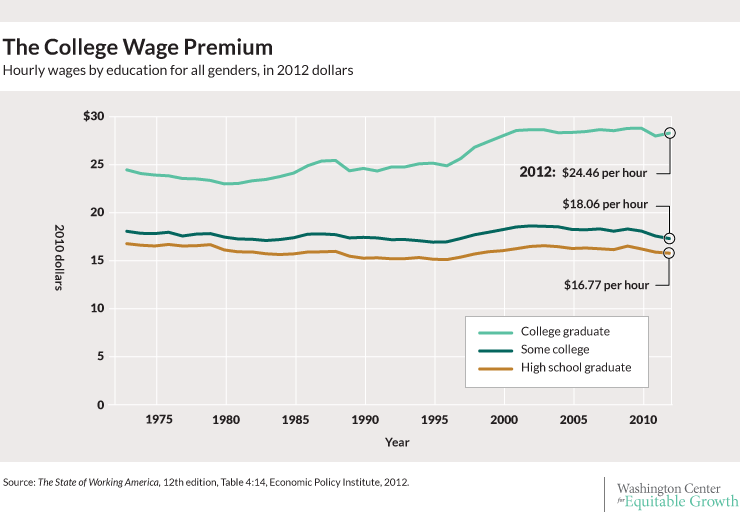Why a college degree isn't worth what it once was
New data suggests a degree is no longer an automatic ticket to the good life


A free daily email with the biggest news stories of the day – and the best features from TheWeek.com
You are now subscribed
Your newsletter sign-up was successful
There's an old joke that if you're being chased by a bear and you want to avoid being eaten, you actually don't have to run faster than the bear. You just have to run faster than the other guy.
As it turns out, that joke may be critical to understanding the role college education plays in the modern economy.
For a few decades now, economists' ideas about education have been dominated by the "human capital" theory — that more education gives people more skills, which makes them more productive, which means they earn higher wages. Ergo the way to fix stagnating incomes for the middle- and lower-class is to give everyone better educations, and especially to amp up the portion of Americans with a college degree.
The Week
Escape your echo chamber. Get the facts behind the news, plus analysis from multiple perspectives.

Sign up for The Week's Free Newsletters
From our morning news briefing to a weekly Good News Newsletter, get the best of The Week delivered directly to your inbox.
From our morning news briefing to a weekly Good News Newsletter, get the best of The Week delivered directly to your inbox.
But that seemingly intuitive idea has taken a data-based beating recently, as John Cassidy recently laid out in The New Yorker.
For a while, the college wage premium — what people with a college degree make over and above those without — grew as the overall portion of Americans with at least a four-year degree also grew. The standard story was that this meant the supply of college graduates wasn't keeping up with the demand for their skill sets.
But according to work by both the Economic Policy Institute (EPI) and the New York Fed, wages going to college graduates flatlined or declined from 2001 to 2013. As a result, the college wage premium stopped growing over the same period. It only increased recently again because wages declined for everyone else.

(Graph courtesy of the Washington Center for Equitable Growth.)
A free daily email with the biggest news stories of the day – and the best features from TheWeek.com
"Wages have been falling most steeply of all among newly minted college graduates," Cassidy noted. The only people whose wages have continued upwards are people with graduate degrees.
What's especially weird is that this all happened while the supply of college graduates just kept climbing. So if you believe the skills story, this implies demand for the skills associated with college degrees flatlined too, but not demand for graduate degree skills. But economist Larry Mishel, EPI's president, pointed out to The Week that the skills story also rests on the assumption that demand for skills is driven by technological change — and if anything, "everybody thinks that technological change has sped up and the demand for college grads is growing even faster than ever."
So Cassidy pointed to an alternative to the skills story: that higher education serves as a kind of rubber stamp of upper class competency to businesses. "By completing a four-year degree, students could signal to potential employers that they had a certain level of cognitive competence and could carry out assigned tasks and work in a group setting," Cassidy wrote. "But a college education didn’t necessarily imbue students with specific work skills that employers needed, or make them more productive."
To fill out that claim, Cassidy brought up evidence that people with four-year degrees from prestigious universities tend to earn more than others with regular four-year degrees, and that lots of professional areas like nursing, secretarial work, and sales have all begun demanding college degrees as a qualification even though the skills required to do the tasks haven't changed much. Mishel lent some credence to this view as well, saying education "does partly function as a sorting mechanism."
But there's arguably something deeper going on. "I think it's mostly the suppression of wages in the bottom two-thirds," Mishel said. His work with some colleagues on inequality concluded that the growth in inequality between the bottom and the middle class happened primarily in the 1980s, and can be linked to the fall-off in the real value of the minimum wage.
As for the top 10 percent pulling away from the middle, that's been almost continuous since 1979, and can be attributed to the collapse of unions, globalization, deregulation, and the failure of the modern economy to achieve full employment on a sustained basis. Then there's the remarkable increase in incomes going to the top 1 percent, which relied heavily on a runaway financial sector, tax cuts, and the capture of corporate revenues.
What's important for the education debate is that this increase in inequality shows up mainly within education groups. "For instance there's a lot of growing wage inequality among college graduates, and among high school graduates," Mishel continued. "In fact the bottom 70 percent of college grads have had stagnant or falling wages" since 2002.
In other words, who has what degree of education may not be a terribly helpful unit of analysis. When we look at the college wage premium, what we're arguably seeing is the collapse of worker bargaining power, the weakening of the labor force, and the resulting rise in inequality. "If you smash unions and smash the minimum wage, you've smashed the wages of high school educated workers," Mishel went on. "Now was that because of technological change that the premium went up? No."
Cassidy pointed out that if the signaling story is true, then a college education only delivers a wage premium if most people don't have one. The whole point is to stand out from the crowd. But in a way, this is true of the skills theory as well: If we magically gave everyone the skills of a four-year degree, that would not mean even janitors would suddenly make upper-class wages. Employers don't pay people on the abstract principle that if you're productive you "deserve" a better salary. They pay based on whether they can find someone else to do the same job for less.
So what all these changes amount to is a far greater portion of the flow of money through the economy over to the elite. As that portion gets bigger, that means less and less money going to the rest of the economy. And that means stagnating wages and job insecurity have kept creeping higher and higher up the income ladder. Both Mishel and Cassidy brought up the increasing phenomenon of people with college degrees showing up in low-income jobs that plainly don't require so much education. There's some evidence this trend may be declining, but it remains far higher than before the 2008 crash.
In this world, a college degree is essentially a "fire me last" sign. As rising inequality bumps less-educated people off the twig entirely, the college-educated fill the spots while graduate degrees get what the college-educated once did. So first incomes for high school graduates stagnate, then incomes for the college-educated stagnate too. And now only graduate incomes are still rising.
"The story of wages is first they came for people without a college degree and then they came for the college grads," Mishel said.
In other words, the bear already ate the other guy, and it's still hungry.
Jeff Spross was the economics and business correspondent at TheWeek.com. He was previously a reporter at ThinkProgress.
-
 ‘Restaurateurs have become millionaires’
‘Restaurateurs have become millionaires’Instant Opinion Opinion, comment and editorials of the day
-
 Earth is rapidly approaching a ‘hothouse’ trajectory of warming
Earth is rapidly approaching a ‘hothouse’ trajectory of warmingThe explainer It may become impossible to fix
-
 Health insurance: Premiums soar as ACA subsidies end
Health insurance: Premiums soar as ACA subsidies endFeature 1.4 million people have dropped coverage
